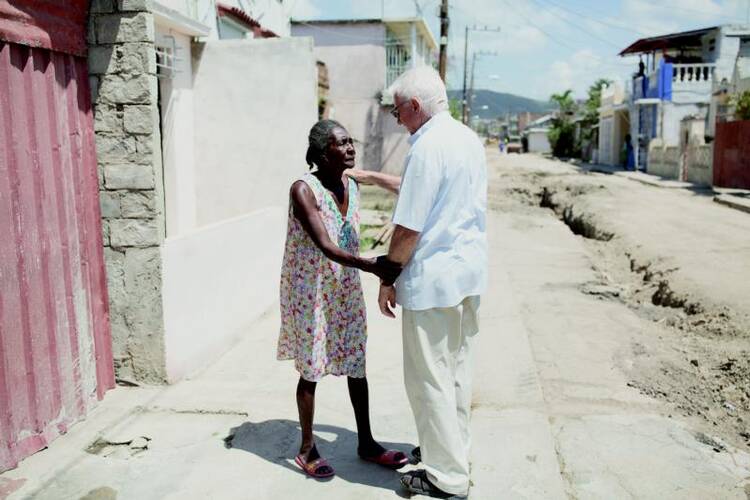Catholic Extension plans to expand its outreach in the Caribbean region, funding church reconstruction in Cuba and expanding its century-long involvement in Puerto Rico in response to the island's ongoing debt crisis.
The effort will cement long-standing relationships among American, Cuban and Puerto Rican Catholics in response to Pope Francis' Year of Mercy plea to reach out to people in need, Father Jack Wall, Catholic Extension president, said during a news conference on Sept. 26 that was streamed online from Chicago.
"It is important that we continue to stand together as a united people of faith," Father Wall said.
"This is something we must do. We must become blessing to each other. We are at our best when we can discover how we can be blessing to each other," he said in response to a question.
The outreach to the Cuban Catholic Church is the first for Catholic Extension, which traditionally serves poor remote communities in the United States and U.S. territories. Catholic Extension's work in Puerto Rico began in 1908.
No dollar amount was set by the agency and a spokeswoman for Catholic Extension told Catholic News Service the final figures were being discussed by the organization.
Catholic Extension noted in supporting documents that it had funded more than $54 million in projects and programs in Puerto Rico's six dioceses in 108 years, with about $22 million spent on 1,400 building projects.
The effort in Cuba will focus on building or repairing churches, church facilities and schools, many of which have been damaged by storms that have pummeled the island 90 miles from Florida.
Father Wall said the Cuban ministry became possible because of the re-establishment of diplomatic relations between Cuba and the U.S., which was announced in December 2014 after Pope Francis personally appealed to President Barack Obama and Cuban President Raul Castro to mend the countries' differences. The pope's efforts followed appeals by St. John Paul II and Pope Benedict XVI since the 1970s.
Six bishops–two from Cuba and four from Puerto Rico–joined the announcement and welcomed the plan to invest in their pastoral ministries.
Archbishop Dionisio Garcia Ibanez of Santiago de Cuba noted the strong ties between the Cuban and U.S. churches that have been built over decades, particularly as thousands of Cubans have resettled in places such as Miami, New York, Washington and Los Angeles.
"Thanks be to God, the Spirit has moved the church. In the middle of these needs in most difficult times, we are church that is prayerful, incarnated and missionary," Archbishop Garcia said.
"Prayerful because we know that our strength only comes from the Lord and if we trust the church will go ahead. It is incarnated because ... it is primary that the Gospel has to be present. Christ can heal our wounds and it is right there that they church needs to be. It is also missionary because even though we have limited resources, the Spirit has moved the church to go out into mission even when it was prohibited," he said through an interpreter.
Bishop Alvaro Beyra of Santisimo Salvador de Bayamo and Manzanillo, Cuba, praised the initiative, calling it historic because it can build stronger relationships between Cuba and the U.S.
"With Catholic Extension's visit to Cuba, we experience the mystery of the church: Why are we here? Why the church? This is not geographical. It is the mystery of faith, the mystery of the church that permits this unity, this sharing our reality which each one has. This is an experience of church. This is where the church is. It goes beyond sociological reason or historical reasons," he said, also through an interpreter.
For Puerto Rico, the expansion of Catholic Extension's work will be particularly helpful as the territory faces ongoing challenges caused by an ongoing debt crisis. Congress passed legislation in June that is allowing the island to restructure billions of dollars in debt while pre-empting lawsuits from creditors seeking repayment of outstanding loans.
Archbishop Robert Gonzalez Nieves of San Juan, president of the Puerto Rican bishops' conference, said that despite the legislation, Puerto Ricans face the prospect of deep cuts in basic services, health care and education. He said young people and professionals are leaving the island for jobs and better opportunities on the U.S. mainland, leaving the elderly and poor behind.
"The situation is slowly evolving into what could be a very serious humanitarian crisis," he said, while thanking Catholic Extension for its commitment.
"The Catholic Church in all our dioceses and Caritas are doing all that we can to address the increasing poverty on the island," he added.
The three other Puerto Rican prelates, Bishop Rube Gonzalez Medina of Ponce, Bishop Daniel Fernandez Torres of Arecibo and Bishop Eusebio Ramos Morales of Fajardo-Humacao, each welcomed the initiative, saying it would allow the church to address its infrastructure needs and strengthen its presence to people facing hunger, substandard housing and little access to health care.








